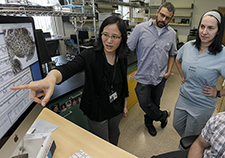Office of Research & Development |
 |
 |
Staff neurologist and research investigator |
By Jewel Luckow
What do you study?
I am a neurologist who specializes in treating sleep disorders at the VA Portland Health Care System in Portland, Oregon. My research program, Sleep & Health Applied Research Program (SHARP), aims to understand sleep and the impact that poor sleep can have on the brain and body. I study how sleep is affected by common conditions among Veterans, including traumatic brain injury (TBI), post-traumatic stress disorder (PTSD), Parkinson’s disease, and Alzheimer’s disease. My team uses animal models as a research tool in order to understand the effects of sleep on the brain and to test novel therapies.
How did you first get interested in this topic?
I decided to become a neurologist because I have always been fascinated by the brain, brain health, aging, and human behavior. Sleep is one of biology’s greatest mysteries. We still don’t know why we need to sleep. Understanding how sleep needs might change over the lifespan and in certain medical conditions is the crux to understanding healthy development and aging.

Neurologist Dr. Miranda Lim (and team members) at the Sleep & Health Applied Research Program in Portland, Oregon, aim to understand and treat sleep disorders in Veterans. (Photo taken before the pandemic.)
What attracted you to the VA?
I have had the privilege of serving our nation’s Veterans at multiple VA hospitals around the country, starting with my medical training over 20 years ago—including VA hospitals in Atlanta, St. Louis, and Philadelphia—prior to committing my clinical and scientific career to the VA in Portland, Oregon. I am grateful for the opportunity to give back to those who so generously gave for us in defense of our country and I cherish the connections that I’ve made over the years with my patients.
The VA has built an incredible, unparalleled nationwide infrastructure that cannot be matched by any other health system in the U.S. In the clinical sleep world, we are on the cutting edge of telehealth and the latest equipment for sleep apnea. In the sleep research world, we have discovered unique sleep disorders tied to TBI and PTSD, allowing us to forge new understanding of how the brain works and new treatments for sleep problems.
Why is your work important to Veterans?
My research particularly benefits Veterans because they are disproportionately affected by TBI and PTSD—both of which can cause sleep problems. For example, my team recently discovered that Veterans who are diagnosed with a TBI or PTSD are at greater risk for rapid eye movement (REM) sleep behavior disorder (RBD), which causes violent movement during the REM stage of sleep. RBD has been linked to the development of Parkinson’s disease. However, we still don’t know whether Veterans with RBD are also at higher risk of Parkinson’s disease—and if so, how might TBI/PTSD trigger this neurodegeneration? These are incredibly important questions that need to be answered for the sake of understanding what our Veterans are going through.
Do you anticipate that your work will eventually bring benefits to other people?
Sleep (or lack thereof) is something that every human being on the planet engages in daily. Sleep is fundamental to our health and wellness. Our modern world—especially with the influence of COVID-19—is fraught with things that could interfere with or come at the expense of sleep. New devices, new methods of communication with family, friends, and the workplace, an increasingly global economy, and spending more time indoors all can impact sleep.
One line of research we are pursuing examines the role of light exposure at different wavelengths and times of day, and how this might affect sleep. Our hope is that a better understanding of the effects of artificial light exposure on sleep will be helpful to people who might be struggling with sleep problems.
Has your work been affected by the COVID-19 pandemic?
All research has been undoubtedly affected by the COVID-19 pandemic. We’ve had nearly a year to pivot, adapt, and use this as an opportunity to think outside the box beyond what traditional research looks like. I’m proud to say that my team members have embraced this opportunity to reimagine our workflow, and that our new research protocols are actually better than they ever were before.
For example, most of our clinic appointments and research visits have been converted to remote visits, which is more convenient for Veterans and others. Also, our studies are now open to anyone in the country and not just local residents. I hope that when the pandemic is over we will still be able to offer this level of flexibility to our patients and research participants.
Do you have any interesting hobbies or volunteer work?
I live and breathe sleep research and I love working with my incredible research team. It’s sometimes very hard for me to step away. But, I do have a life outside of research. A little-known fact about my distant past: I played division I women’s water polo at the University of Southern California from 1994-1998. Currently, I love spending time with my family, including my incredibly supportive husband and our three young children.
My older two children have a diagnosis of autism spectrum disorder, which has been an amazing journey that I am grateful to share with them. I've learned to understand the world through their eyes—they teach me so much every day. We love to hike and camp and learn all about native plants of the Pacific Northwest. Our favorite place to camp is in the Olympic National Forest.